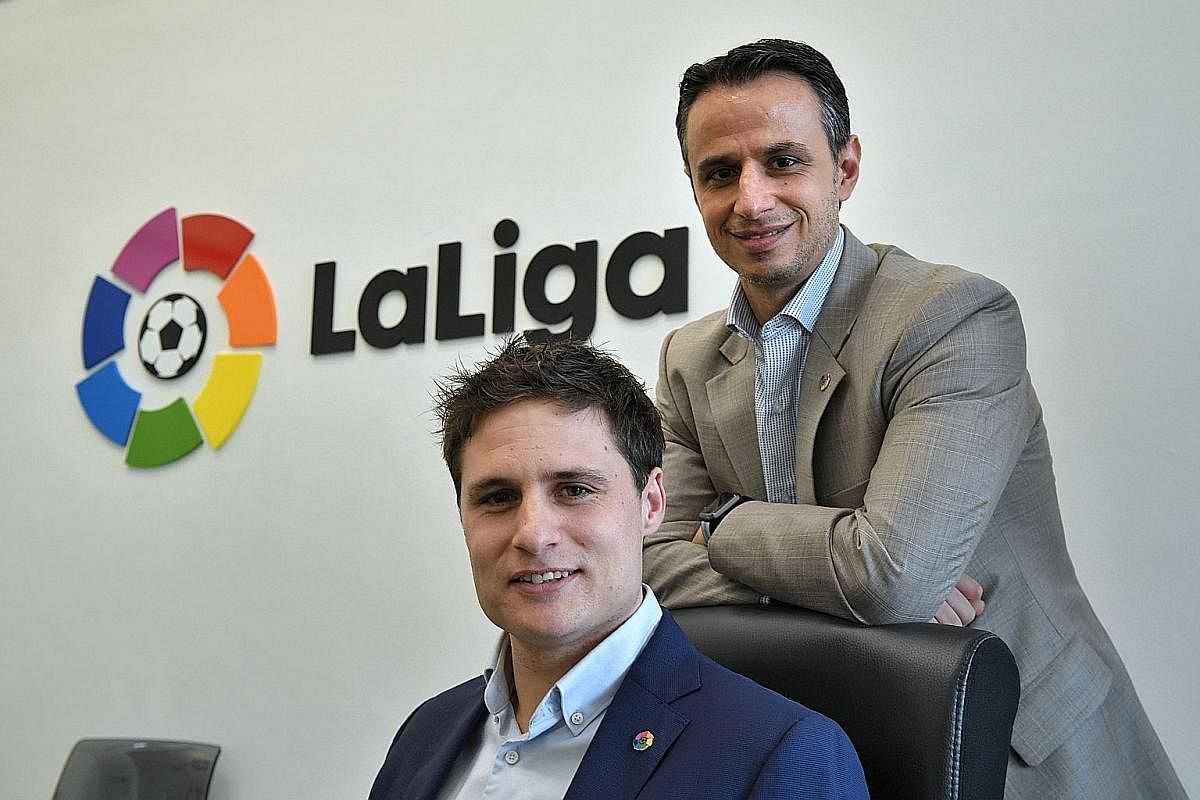-
2.9x
Jump in LaLiga's social media followers to 46 million from 16 million in August 2016.
-
€3b
LaLiga's projected television revenue (S$4.9 billion) from the 2017-18 season, behind the English Premier League's €5.1 billion and the German Bundesliga's €3.2 billion.
The Business Of Sport
Business of Sport: Late to Asia, LaLiga makes up for lost time
Spanish football league targets bigger slice of the cake and 400m viewers in region by 2020

SD Eibar will not be most fans' guess for the third-most followed Spanish football club in Japan, behind Real Madrid and Barcelona. Yet the Basque team's popularity - thanks largely to their midfielder Takashi Inui - illustrates the opportunities in Asia for LaLiga.
"Eight years ago, LaLiga in Asia was at most Real Madrid and Barcelona. Nowadays we see people following more teams like Atletico Madrid, Villarreal, Sevilla," LaLiga's director of international development Oscar Mayo told The Straits Times last week.
The organisation, which runs the top two tiers of professional football in Spain, has expanded rapidly into the region within the last five years and now has five offices in Asia, including one in Singapore set up last March.
"We know we are the best league and entertainment product in the world. We have the best players, best teams, best performers," said Mayo. "So we are confident that if we can get fans in Asia to know more about LaLiga, we are going to convert them into LaLiga fans."
Real and Barcelona have won the last four Champions League titles. Their biggest stars, Cristiano Ronaldo and Lionel Messi respectively, have split the last ten Ballon d'Or awards between them.
The focus on growing the profile of LaLiga clubs mirrors the more equitable TV revenue deal that came into place for the 2016-17 season. Under the new model, 50 per cent of revenue is split among all 20 clubs, with 25 per cent distributed based on finishing position and 25 per cent by metrics such as attendance and season tickets sold.
The lowest finisher last season, Granada, earned €62 million (S$100.6 million), more than twice what Las Palmas earned the previous season ( €28 million).
Champions Real Madrid earned €150 million last season, compared to €140 million in 2015-16.
While the popularity of the English Premier League (EPL) in Asia is unchallenged, LaLiga is convinced that there is room to grow the region. Ivan Codina, who heads the Singapore office overseeing South-east Asia, Australia, South Korea and Japan, said: "We were not that active in this part of the world previously and most of our main competitors like EPL have established themselves for many years.
"But I don't like to say we are directly competing with the other leagues. We know the cake is big enough in Asia. We're looking at, for this office combined, a 700 million population."
The Spanish-speaking Latin American markets have been LaLiga's No. 1 market outside of Spain. That could soon change as it is targeting to reach 400 million viewers in Asia by 2020, about double the current figure.
The Singapore branch works with the main LaLiga office in Madrid and global network delegates in each of the different markets to produce localised strategies and content, an approach that has been applied across all of LaLiga's international offices.
Codina said one thing his team have been working on is producing content in fans' local languages.
"In every market we try to identify one of the common areas that we can engage with the fans because they may not have the knowledge yet," he said. "In Indonesia we are engaging a local PR agency with the idea to generate more content in Bahasa. We have seen that the level of engagement when you create content increases drastically when you are able to communicate in the local language."
The numbers tell the story. In August 2016, LaLiga had 16 million social media followers across all platforms. This month, the figure has swelled to 46 million, adding over two million followers from Chinese social media platforms Weibo and WeChat alone.
LaLiga lags behind its European rivals in terms of television revenue, however. Consultancy firm Deloitte projected last July that EPL clubs will make €5.1 billion from the ongoing 2017-18 season, German Bundesliga clubs €3.2 billion, while LaLiga clubs will make just €3 billion.
In a bid to overturn the status quo, last December's Real-Barcelona El Clasico was shifted to a lunch-time kick-off (8pm Singapore time) for the first time to coincide with prime-time hours in Asia.
Four LaLiga matches per week have early kick-offs, ranging from 7pm to 11.15pm (Singapore time).
"Before, maybe three years ago, it was almost impossible to think that we would have an El Clasico like the last one," said Codina. "That is not a random decision. That is a strategy to make sure more people are able to see our product personally."
Mayo said LaLiga's aim was to become the "second league" in every market, behind the domestic league. He said: "We are committed to support all the domestic leagues, to share know-how, get into youth development and help the domestic associations improve."
On Monday, LaLiga signed a memorandum of understanding with its Malaysian counterpart that will involve sharing expertise on finance, technology and good governance, among other things.
The organisation is also exploring digital trends like online streaming.
"Some people talk about it as the near future but it is already happening," said Codina. "For us it is a good opportunity. We always want to be ahead for any new opportunities."
• The Business of Sport is a monthly series that explores the current trends and talking points of the emerging sports industry.
Join ST's Telegram channel and get the latest breaking news delivered to you.
A version of this article appeared in the print edition of The Straits Times on January 26, 2018, with the headline Business of Sport: Late to Asia, LaLiga makes up for lost time. Subscribe

